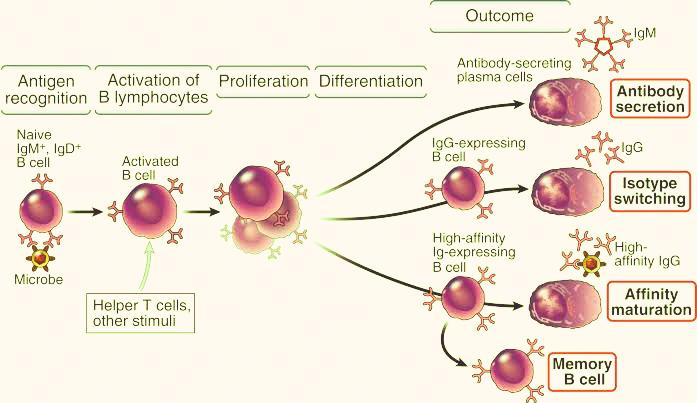
Antibodies are synthesized by
A) Eosinophil
B) Lymphocyte
C) Monocyte
D) Neutrophil
Answer
596.7k+ views
Hint: They are responsible for the production of antibodies in our bodies. In some serious conditions like leukemia, its level in blood increases tremendously.
Complete answer:
Lymphocytes cells are present in our blood and are part of our immune system. They are responsible for the synthesis of antibodies. They are of two types: T cells and B cells. B cells are responsible for the production of antibody molecules that can destroy invading viruses or bacteria.
Antibodies are also known as immunoglobulin as they are made up of immune system-related proteins. Each antibody consists of four polypeptides out of which two are heavy chains and two light chains both joined to form a "Y" shaped molecule.
In the tips of the "Y", the amino acid sequence varies greatly among different antibodies and the base of the “Y” plays a role in modulating the activity of immune cells.
Antibodies are used by the immune system to identify and neutralize or destroy any invading foreign objects such as bacteria and viruses.

So, the correct answer is Antibodies are synthesized by lymphocytes.
Note:
1) Eosinophil These are specialized cells present in the immune system which consists of a nucleus with two lobes and a cytoplasm containing enzymes and proteins with different functions.
2) Monocytes are also a type of leukocyte or white blood cell. They are the largest ones of white blood cells and can be differentiated into macrophages and myeloid lineage dendritic cells. They also influence the process of adaptive immunity.
3) Neutrophils can make- around 40% to 70% of all white blood cells in humans. They form an essential part of the innate immune system, with varying functions in different animals.
Complete answer:
Lymphocytes cells are present in our blood and are part of our immune system. They are responsible for the synthesis of antibodies. They are of two types: T cells and B cells. B cells are responsible for the production of antibody molecules that can destroy invading viruses or bacteria.
Antibodies are also known as immunoglobulin as they are made up of immune system-related proteins. Each antibody consists of four polypeptides out of which two are heavy chains and two light chains both joined to form a "Y" shaped molecule.
In the tips of the "Y", the amino acid sequence varies greatly among different antibodies and the base of the “Y” plays a role in modulating the activity of immune cells.
Antibodies are used by the immune system to identify and neutralize or destroy any invading foreign objects such as bacteria and viruses.

So, the correct answer is Antibodies are synthesized by lymphocytes.
Note:
1) Eosinophil These are specialized cells present in the immune system which consists of a nucleus with two lobes and a cytoplasm containing enzymes and proteins with different functions.
2) Monocytes are also a type of leukocyte or white blood cell. They are the largest ones of white blood cells and can be differentiated into macrophages and myeloid lineage dendritic cells. They also influence the process of adaptive immunity.
3) Neutrophils can make- around 40% to 70% of all white blood cells in humans. They form an essential part of the innate immune system, with varying functions in different animals.
Recently Updated Pages
Master Class 12 Economics: Engaging Questions & Answers for Success

Master Class 12 Physics: Engaging Questions & Answers for Success

Master Class 12 English: Engaging Questions & Answers for Success

Master Class 12 Social Science: Engaging Questions & Answers for Success

Master Class 12 Maths: Engaging Questions & Answers for Success

Master Class 12 Business Studies: Engaging Questions & Answers for Success

Trending doubts
Which are the Top 10 Largest Countries of the World?

What are the major means of transport Explain each class 12 social science CBSE

Draw a labelled sketch of the human eye class 12 physics CBSE

Why cannot DNA pass through cell membranes class 12 biology CBSE

Differentiate between insitu conservation and exsitu class 12 biology CBSE

Draw a neat and well labeled diagram of TS of ovary class 12 biology CBSE




